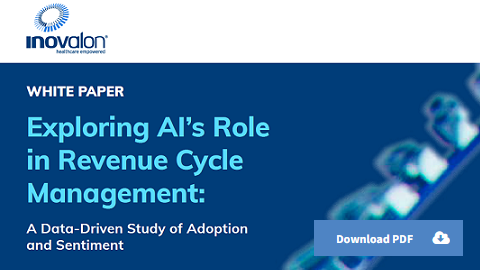A Data-Driven Study of Adoption and Sentiment
Executive Summary
An Inovalon research study conducted among over 400 healthcare leaders and professionals revealed a variety of perspectives on using artificial intelligence (AI) in the healthcare revenue cycle.
Executives and managers were generally optimistic about AI. They could easily articulate use cases for AI within their revenue cycles, most frequently enabling efficiency while preventing and managing denials.
Executives and managers were also thoughtful about the conditions/requirements under which they would engage AI-enabled revenue cycle solutions. These requirements include the need for rigorous testing and training of the AI, and the need to have their experienced revenue cycle team driving process and decisions, with AI playing a critical, yet subordinate role.
Key takeaways:
- Significant optimism is the prevailing sentiment toward AI’s potential in healthcare revenue cycle management (RCM).
- Providers recognize the value AI can bring to the healthcare revenue cycle – particularly to areas like denials prevention and management.
- In hospitals, executive leaders are especially optimistic about the promise of AI.
Introduction
Background
Artificial Intelligence (AI) is an innovation which could have major positive impact for healthcare. Although AI is in relatively early stages of adoption, its potential for application across many aspects of clinical and operational workflows is becoming increasingly apparent.
At the same time, financial and revenue cycle leaders are prioritizing greater automation and unification of revenue cycle [see Figure 1], while focusing on important revenue challenges such as denials, patient payment, and the complexity of locating accurate patient coverage and benefits [see Figure 2].
In the context of revenue performance improvement priorities, and AI’s potential promise, Inovalon initiated a research study to explore perspectives on the use of AI in the revenue cycle.
About This Research
To form a holistic and representative view of provider perspectives, a diverse group of over 400 revenue cycle and financial executives and managers were asked for their perspectives on using AI in revenue cycle. These professionals weighed in from across the healthcare landscape, including health systems, hospitals, physician groups, and post-acute care providers.
Participants had excellent visibility across their organizations’ revenue cycle, end-to-end. Participants were asked a series of questions designed to gauge their attitudes, concerns, and expectations regarding AI in RCM. The survey explored topics such as perceived benefits and concerns of AI, and areas where AI might improve revenue cycle management.
Challenges Ranked as Top and Important
Sizable majorities of respondents agreed that the following issues were significant for their organizations.
Key Survey Results
Overall AI Sentiment
The insights gleaned from this research show that overall, the sentiment toward AI is positive. Nevertheless, many of those who were optimistic expressed caution, an indication that they would likely not take the plunge without appropriate guardrails to ensure the success of an AI-enabled revenue cycle. Their common desire is for providers to remain in the driver’s seat when employing AI, with AI assisting in enhancing the patient experience and optimizing outcomes.
A Positive Outlook, But With Sizable Hesitation and Unfamiliarity
“AI is so new, I’m not sure how to answer this. But, I know it is coming and I believe it will be helpful.”
Reasons for Optimism
- “If AI could flag potential denials ahead of submission of claim, that would be tremendously helpful.”
- “Identify trends in denials that we may miss. Automatically create appeals when setting up with parameters.”
Promising Applications for AI
Participants were asked to specifically articulate areas where their organization’s revenue cycle could be improved using thoughtful application of AI. Applied AI was expected to drive additional efficiency and process optimization in these broad areas.
- Predict denials, flag potential denials prior to submission, appeal mass denials, or generate appeal letters to overturn denials
- Alerts to prevent friction in the revenue cycle or surface overlooked items
- Provision of revenue cycle insights
- AI-based pre-reviews to speed up conventional review processes
- Cost control via selective automation of expensive human-oriented tasks
- Accelerate communications for patient collections (replies to patient inquiries)
- Diagnosing and solving for problems within the overall revenue cycle
- Risk assessment
AI-Driven Solutions for RCM Staff Shortages
Participants also provided examples of how AI was expected to mitigate any staff shortages in revenue cycle teams, allowing staff to work at the top of certification, and freeing staff to be their best, most personable selves when interacting with patients and families.
- By reducing manual process, enabling staff to maximize their certifications
- By standing proxy for staff member experience during high turnover periods
- Potentially reducing level of training required

